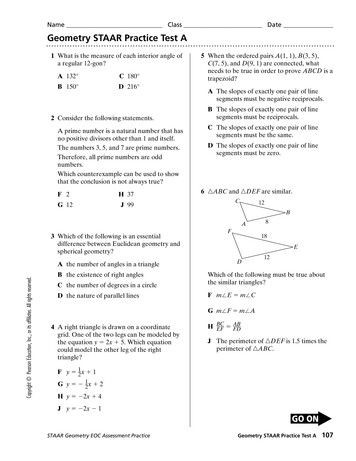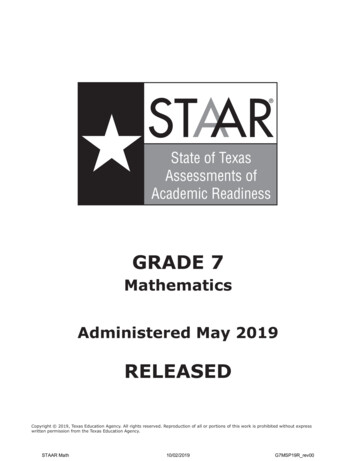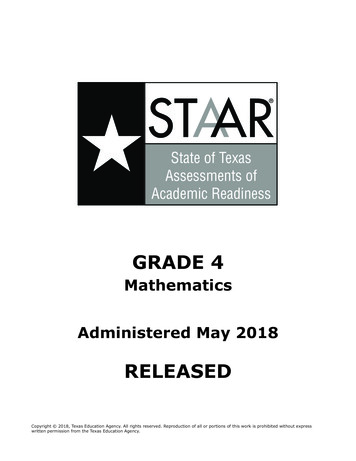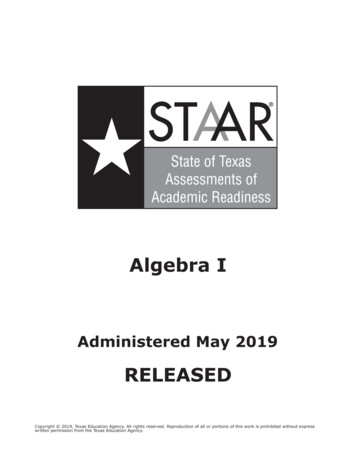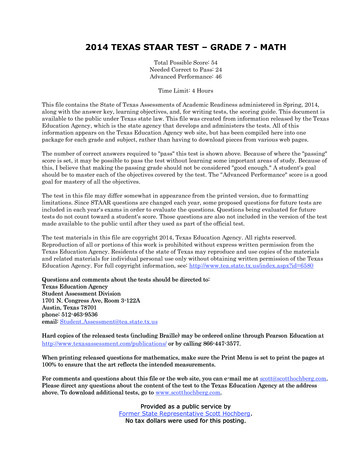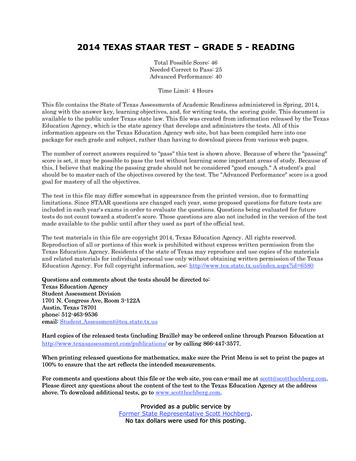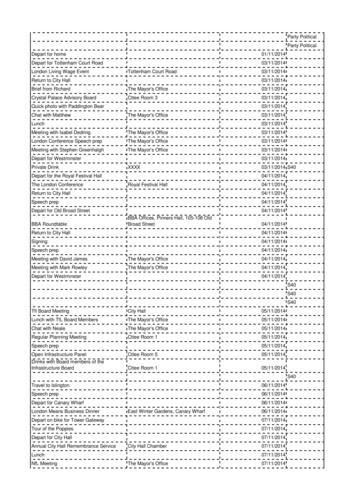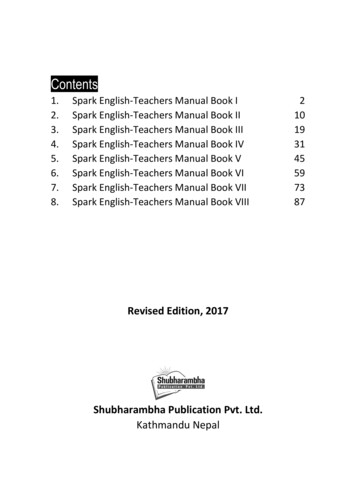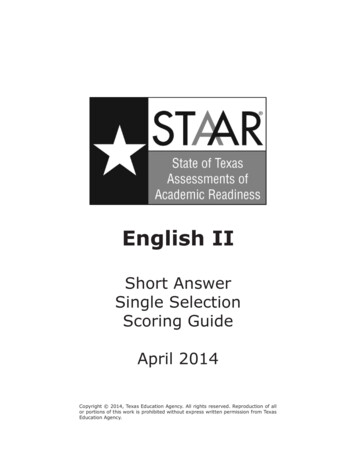
Transcription
English IIShort AnswerSingle SelectionScoring GuideApril 2014Copyright 2014, Texas Education Agency. All rights reserved. Reproduction of allor portions of this work is prohibited without express written permission from TexasEducation Agency.
Read the selection and choose the best answer to each question. Then fillin the answer on your answer document.Is Criticism a Four-Letter Word?by Steven Frank1The movie was E.T. The moment we stepped out of the theater, my olderbrother asked the dreaded question: “What did you think of the film?”2Whatever opinion I held of the “film” was about to be shredded.3“I’ll tell you as soon as I go to the bathroom.”4He followed me in.5Turning away for maximum privacy, I confessed that I had liked the movie.It had moved me.6“Well,” my brother said, “I found it maudlin and manipulative. ‘E.T. phonehome.’ Honestly, Steve.”7I spent the rest of my childhood keeping my opinions of books and movies tomyself.8Since then, I’ve spent a lot of time wondering whether criticism is a fourletter word. Of course, I can count nine letters there, but is the spirit of theword offensive? I decided to ask my students what they thought, so I wrotecriticism on the board, and we played the first-word-that-comes-to mindgame.9 Judgmental, mean, nasty, and hurtful were the top four responses.10“Is all criticism negative?” I asked.11The consensus was yes.12I tried a different word: review.13 Opinion, evaluation, advice, and guide, they responded.14It may be a question of semantics. People don’t like the word criticizebecause it’s what they think their parents always do: Your room coulddouble for the city dump.15Is it any wonder that parents often hear their anguished teens shouting,“Why do you always criticize me?”16Suppose we swapped words—and attitudes. “Mom, I’d like you to review myroom, please.”
17“Review it?”18“Yes. Evaluate it. Constructively. Sensibly.”19Then a conversation might take place. “Well, honey, I’ve noticed somespecific hazards there. The DVDs on the floor, for instance, are slippery, andif you step on one in the middle of the night, you might fall. Further, thatturkey sandwich you forgot to throw away is starting to grow mold. And ifyou wanted to invite a friend over, it might help if you cleared a space onyour chair for him to sit down.”20Notice that in this scenario, the parent is supporting her opinion withconcrete evidence. The criticism feels less, well, critical, because it makessense. And that’s what a good piece of criticism ought to do.21Suppose you’re asked to write a critical evaluation of a book. Don’t just trashit. You should take an honest look at what works about it and what doesn’t.Start with an opinion, but be sure to back up that opinion by answering afew key questions: Are the characters credible? Do they think, feel, and actlike human beings (even if they’re aliens)? The poet Marianne Moore oncedescribed what readers want in literature as “imaginary gardens with realtoads.” The setting of a book can be as outrageous as a strange world downa rabbit hole, but the characters that live there must seem believable.22They should also be well rounded. Look for characters that seem real, notstereotypical. Good heroes have flaws; good villains have fans. Take Satan,for example, in John Milton’s Paradise Lost. He’s so charming, he’s hard tohate.23Also ask whether the main character evolves. Harry Potter gains confidence.Hamlet finds his voice (a little late). Alice learns how to read strangers inWonderland. In a good book, the protagonist grows.24A book’s plot should be believable too. Do the turning points lead the readerto the next in a credible, even inevitable, chain of events? A plot with toomany coincidences is contrived. Most action movies have contrived plots—the hero walks through a swarm of bullets and is never hit, then turns andfires a single shot to defeat his enemy. (Stories like that can be great fun;they’re just not great literature.)25A well-crafted plot surprises you with believable twists. I’m still thrilled everytime I find out that Charlie inherits the chocolate factory, because everythingleading up to that outcome has been quietly pointing the way.26The best critics don’t just spew their opinions; they help you form anddeepen yours by examining an experience so carefully as to see it inside out.27In school, you’re probably most often assigned book reviews or moviereviews, but don’t let your critical eye glaze over on those familiar genres.
Try writing a restaurant review (it’s a great excuse to go out to dinner).Review a video game, a blog, or a new album. Review a building that justwent up downtown or a date you went on. And if your parents are beinghypercritical, ask them if they wouldn’t mind a little constructive evaluationin the form of a parent review.How to Offer Constructive Criticism Focus on facts, not feelings. Just state the problem and keep emotion outof it. Be specific. Explain what your criticism relates to, in detail. Be timely. Discuss a situation as soon as your emotions cool. Be direct but tactful. Make sure that you use the words that you actuallymean, instead of searching for a softer word that doesn’t really makeyour point. Give feedback in private. You don’t need to embarrass someone in frontof an audience. Take the person aside and speak with him or herone-on-one. Know what you want to say. You may even want to write down key pointsso that you don’t forget anything or get sidetracked. Listen to what the other person has to say. After you speak your mind,listen to the other side of the story. You may not be aware of somecircumstances. Keep an open mind, listen, and be sure to communicateregularly.28Illustration courtesy of iStockphoto.com/Colin CrammWhether in our personal or professional lives, we sometimes find the need toaddress problems or conflicts with friends, family members, or colleagues.Here are some suggestions to keep in mind when delivering constructivecriticism.It’s taken me 30 years to learn something critical about criticism. Criticismisn’t just an attack; it’s a defense. If I had been trained to think critically, Icould have defended my opinion of E.T. I could have countered my brother’sdismissive “maudlin and manipulative” by saying, “Well, I think the movie isconvincing. What lonely boy doesn’t need a friend, especially a friend withmagic powers to heal wounds and make bicycles fly? And if you got lost afew billion miles from your family, wouldn’t you want to phone home too?”
29Why write criticism? Because if you write your opinions—and support themwith good, logical thinking—you’ll be something that I wish I’d been as ateen.30Confident.31And that’s another nine-letter word.By Steven Frank
English II Short AnswerSingle SelectionIn “Is Criticism a Four-Letter Word?,” how does the author feel aboutcriticism? Support your answer with evidence from the selection.
STAAR English IISingle SelectionScore Point 0 — Insufficient Response to the QuestionInsufficient responses indicate a very limited reading performance.These responses have one of the following problems.The idea is not an answer to the question asked.The idea is incorrect because it is not based on the text.The idea is too general, vague, or unclear to determine whether it isreasonable.No idea is present. Sometimes the response contains only text evidence. Atother times there appears to be an idea; however, this idea cannot beconsidered an answer to the question because it merely repeats verbatim, or“echoes,” the text evidence.Texas Education AgencyStudent Assessment DivisionApril 2014
STAAR English IIApril 2014Single — 1Score Point 0This response is insufficient because the idea is not an answer to the question asked. Thequestion asks how the author feels about criticism, not whether he should have shared hisopinion with his brother.Single — 2Score Point 0In this response the student presents the idea that the author thinks that criticism is bad.While the author acknowledges that criticism can be negative, the claim that it is mostly a badthing is based only on the first seven paragraphs and indicates a misreading of the selectionoverall. Because the idea is incorrect, the textual evidence provided is irrelevant. Therefore,this response is insufficient.
STAAR English IIApril 2014Single — 3Score Point 0The student presents an idea that is too vague to determine whether it is reasonable. Theidea that criticism should be given all the time is not specific enough to be considered a validanswer to the question asked.Single — 4Score Point 0The student provides the question and text from the selection, but the student does not offer anidea. Because no idea is presented, this response indicates a very limited reading performance.
STAAR English IISingle SelectionScore Point 1 — Partially Sufficient Response to theQuestionPartially sufficient responses indicate a basic reading performance.These responses have one of the following characteristics.The idea is reasonable, but the response contains no text evidence.The idea is reasonable, but the text evidence is flawed and does notadequately support the idea. Text evidence is considered inadequate when itisooooonly a general reference to the text,too partial to support the idea,weakly linked to the idea, orused inappropriately because it wrongly manipulates the meaning of thetext.The idea needs more explanation or specificity even though it is supportedwith text evidence.The idea represents only a literal reading of the text, with or without textevidence.Texas Education AgencyStudent Assessment DivisionApril 2014
STAAR English IIApril 2014Single — 5Score Point 1The student presents the reasonable idea that the author provides a new perspective oncriticism by offering ways to use it positively and constructively, as opposed to harshly andnegatively. Although additional analysis is offered, no textual evidence is provided to supportthe idea. Therefore, this response is only partially sufficient.Single — 6Score Point 1The student offers the reasonable idea that the author prefers the words “review” or“evaluation” over “criticism” because criticism should be beneficial. Although the studentattempts to support this idea with evidence from the text, the evidence is flawed. The studentprovides only general text references rather than specific textual support. For this reason, thestudent’s reading performance is considered basic.
STAAR English IIApril 2014Single — 7Score Point 1The student presents the reasonable idea that criticism can make a person confident whenused correctly. However, the textual evidence provided is flawed because it is only weaklylinked to this idea. The text supports the idea that criticism feels less critical and makes moresense when it is properly given; the text does not support the idea that it makes a personconfident. Therefore, this response indicates only a basic reading performance.Single — 8Score Point 1The student offers the general idea that the author feels criticism is good because it is a reallyimportant part of life. Although textual evidence is provided as support, the idea needs moreexplanation or specificity. Therefore, this response is only partially sufficient.
STAAR English IISingle SelectionScore Point 2 — Sufficient Response to the QuestionSufficient responses indicate a satisfactory reading performance.These responses have the following characteristics.The idea is reasonable and goes beyond a literal reading of the text. It isexplained specifically enough to show that the student can make appropriateconnections across the text and draw valid conclusions.The text evidence used to support the idea is accurate and relevant.The idea and text evidence used to support it are clearly linked.The combination of the idea and the text evidence demonstrates a goodunderstanding of the text.Texas Education AgencyStudent Assessment DivisionApril 2014
STAAR English IIApril 2014Single — 9Score Point 2The student presents the reasonable idea that the author feels criticism should be usedconstructively and responsibly. The student provides relevant quotations that support theidea, making this a sufficient response.Single — 10Score Point 2The student presents the reasonable idea that the author believes criticism does not always needto be hurtful; it can also be helpful. The student provides a direct quotation that shows howcriticism can help others to form and deepen their own opinions. The student demonstrates agood understanding of the selection.
STAAR English IIApril 2014Single — 11Score Point 2The student offers the reasonable idea that criticism is not only an opinion but also a wellthought-out review of a book or movie. The direct quotation provided is clearly linked tothe idea and shows that the student can draw a valid conclusion. This response represents asatisfactory reading performance.Single — 12Score Point 2The student presents the reasonable idea that the author believes many people who viewcriticism negatively overlook the fact that it can function as a review. The student offers ananalysis of this idea and supports this analysis with clearly linked text. Although the analysisis stronger than the text evidence, the combination of the two shows that the student has agood understanding of the selection.
STAAR English IISingle SelectionScore Point 3 — Exemplary Response to the QuestionExemplary responses indicate an accomplished reading performance.These responses have the following characteristics.The idea is perceptive and reflects an awareness of the complexities of thetext. The student is able to develop a coherent explanation of the idea bymaking discerning connections across the text.The text evidence used to support the idea is specific and well chosen.Overall, the evidence strongly supports the validity of the idea.The combination of the idea and the text evidence demonstrates a deepunderstanding of the text.Texas Education AgencyStudent Assessment DivisionApril 2014
STAAR English IIApril 2014Single — 13Score Point 3The student develops a coherent explanation of the author’s belief that criticism shouldfunction more as a review based on facts than as a critique based on personal opinions. Bymaking discerning connections across the selection and including well-chosen text evidence,the student strongly supports the explanation provided, making this an exemplary response.Single — 14Score Point 3The student presents the perceptive idea that the author feels criticism can have a positiveeffect and can make a person confident as long as it is used constructively. The student showsan awareness of the complexities of the text by recognizing that the author uses the positiveconnotation of the word “confident” to emphasize the positive effect of “criticism.” Thestudent uses well-chosen quotations to strongly support the validity of the idea. This responseindicates that the student’s reading performance is accomplished.
STAAR English IIApril 2014Single — 15Score Point 3The student makes a discerning connection across the selection by explaining that the authorhas gained confidence by learning how to think critically, something he regrets he did notlearn earlier in his life. The student supports this analysis with a series of direct quotationsthat specifically show the author’s regret. The combination of the analysis and text evidenceshows that the student has a deep understanding of the text.Single — 16Score Point 3In this exemplary response, the student presents the perceptive idea that the author believescriticism to mean an analytical, constructive review that offers one’s thoughts about a situationwithout any interfering emotions. The idea reflects an awareness of the complexities of theselection, and the well-chosen direct quotation from the selection strongly supports the idea.This response represents an accomplished reading performance.
Is Criticism a Four-Letter Word? by Steven Frank 1 The movie was E.T. The moment we stepped out of the theater, my older brother asked the dreaded question: “What did you think of the film?” 2 Whatever opinion I held of the “film” was about to be shredded. 3 “I’ll tell you as soon as I go to the bathroom.” 4 He followed me in.
